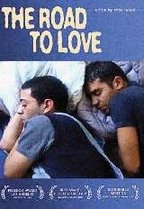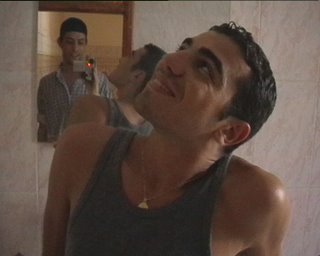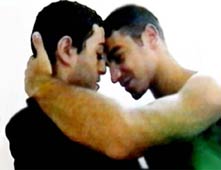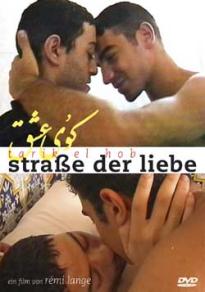Road to Love

The Road to Love
2003
France-Algerian
Cast & Crew:
Karim Tarek, Riyad Echahi, Mustapha khaddar
Directed by Rem Lange
REVIEW SUMMARY
The story of an Arab student in Paris who discovers his homosexuality while working on a video project for his sociology class, Rémi Lange's "Road to Love" doesn t add much to the coming-out genre, as it has been established in countless Sundance competition films and made for television movies. It's crystal clear where "The Road to Love" is headed after its first few minutes, and the feature, crudely shot with what seems to be an amateur video camera, has little to offer in the way of stylistic compensation. But some interesting reporting enters around the edges of the familiar storyline, as Karim uncovers the complicated and often contradictory attitudes toward homosexuality in Islam. — Dave Kehr, The New York Times
 A Review By Bassam K
A Review By Bassam KTarik el Hob or The Road to Love (France, 2002, 70 min) is a film by the French director Rémi Lange. I watched Tarik el Hob in October 2004 at the 8th Annual Arab Film Festival in San Francisco. The story is a smart, romantic tale of self-discovery, and it offers a historical take on homosexuality in North Africa.
Karim (Karim Tarek) is a French-Algerian sociology student in Paris. While he was sitting with his girlfriend Sihem (Sihem Benamoune), he heard on television about the historical marriage rituals between men at Siwa in Egypt, which triggered him to work on a research topic about male homosexuality in North Africa. While he was filming his documentary, Karim interviewed several openly gay Maghrebian men in Paris. The handsome French-Algerian steward Farid (Farid Tali) was one of them. Farid was convinced that Karim’s interest in researching the subject of homosexuality is not just intellectual curiosity. Farid played the role of the catalyst that made Karim question his own sexuality.

The filmmaker took his camera from Paris to Morocco, and shot few scenes in Marseilles and Amsterdam. In Morocco, Karim and Farid had visited Jean Genet's grave in Larache by the ocean before they went to Tangiers to bring the film to an end. Their trip to North Africa (following Genet’s path as if it were a “Road to Love”) was a sweet twist to the coming out narrative.
 The end of the story was short. The director could have added more scenes to make the end less confusing to some viewers. I have enjoyed the conclusion of the film but some viewers did not get it because it was rushed.
The end of the story was short. The director could have added more scenes to make the end less confusing to some viewers. I have enjoyed the conclusion of the film but some viewers did not get it because it was rushed.Sihem’s role represents many women in the Muslim, Arab, or even Western cultures. Those women fall in love and sometimes marry gay men who either are in denial or are closeted. Sihem had been a victim in this film until she decided to take matters in her own hands. One cannot but sympathize with Sihem, and at the same time feel sorry for Karim who grew up in a society that did not give him the option to look deep into his soul to find out whether he was attracted to women or men.
 The viewers noticed that Karim is fascinated with the movies of the Syrian Druze singer Farid el-Atrash. Karim loved the belly dancing in those 1950’s-1960’s films, and he practiced in front of a mirror to improve the moves of his hips and hands (these were very funny scenes). The walls in Karim’s room were covered by posters of the original Farid el-Atrash’s films. The poster of the film Tarik el Hob (see picture) is based on a poster of a film of Farid el-Atrash. Someone in the audience in San Francisco was offended of using the picture of his favorite singer, the late Farid el-Atrash who passed away in 1974. Whether the director Rémi Lange has meant to hint anything about el-Atrash’s sexual orientation was not the point of the film. But anyone who had seen el-Atrash’s films would not be shocked by such claim, whether it was true or false. (Read “My Mother’s Song” on Bint el Nas, a magazine for queer Arab women.) However, it is the right of a male character to be fascinated by a male singer. No one in an Arab audience would be offended if the character were a female who was dreaming to marry a male singer. That is why, the negative reaction to the poster was just plain homophobic.
The viewers noticed that Karim is fascinated with the movies of the Syrian Druze singer Farid el-Atrash. Karim loved the belly dancing in those 1950’s-1960’s films, and he practiced in front of a mirror to improve the moves of his hips and hands (these were very funny scenes). The walls in Karim’s room were covered by posters of the original Farid el-Atrash’s films. The poster of the film Tarik el Hob (see picture) is based on a poster of a film of Farid el-Atrash. Someone in the audience in San Francisco was offended of using the picture of his favorite singer, the late Farid el-Atrash who passed away in 1974. Whether the director Rémi Lange has meant to hint anything about el-Atrash’s sexual orientation was not the point of the film. But anyone who had seen el-Atrash’s films would not be shocked by such claim, whether it was true or false. (Read “My Mother’s Song” on Bint el Nas, a magazine for queer Arab women.) However, it is the right of a male character to be fascinated by a male singer. No one in an Arab audience would be offended if the character were a female who was dreaming to marry a male singer. That is why, the negative reaction to the poster was just plain homophobic. The filmmaker used a handheld video camera. The scenes were filmed as a long shot in one camera. This made the movie look less professional, which is too bad because the story and actors in this feature film were good. On the other hand, this technique of using one handheld video camera seemed to me suitable because the story was about Karim who was shooting a documentary with his handheld camera. In other words, Rémi Lange was filming Karim who, in his turn, was filming young Maghrebian gay men.
The filmmaker used a handheld video camera. The scenes were filmed as a long shot in one camera. This made the movie look less professional, which is too bad because the story and actors in this feature film were good. On the other hand, this technique of using one handheld video camera seemed to me suitable because the story was about Karim who was shooting a documentary with his handheld camera. In other words, Rémi Lange was filming Karim who, in his turn, was filming young Maghrebian gay men.Homosexuality is still a taboo in Arab and Muslim societies. However, Tarik el Hob was not shy about discussing the historic precedents of same-sex marriages, and the contemporary ideas of what it means to be gay and Arab.
Tarik el Hob is the winner of Best Feature Film Award at the 2003 Seattle Lesbian and Gay Film Festival. It is available for sale through the Arab Film Distribution website. The film is in French and Arabic, with English subtitles.

0 Comments:
Post a Comment
<< Home